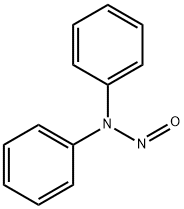86-30-6

Product Name:
N-Nitrosodiphenylamine
Formula:
C12H10N2O
Synonyms:
N-Nitroso-N-phenylaniline;Diphenylnitrosamine;Diphenylnitrosoamine;N-Nitroso-N-phenylaniline
Inquiry
CHEMICAL AND PHYSICAL PROPERTIES
| Physical Description | N-nitrosodiphenylamine appears as yellow to brown or orange powder or flakes or a black solid. Insoluble in water and denser in water. Hence sinks in water. (NTP, 1992) |
|---|---|
| Color/Form | Yellow plates from ligroin |
| Boiling Point | 101 °C |
| Melting Point | 151.7 °F (NTP, 1992) |
| Solubility | less than 1 mg/mL at 66 °F (NTP, 1992) |
| Density | 1.23 (NTP, 1992) - Denser than water; will sink |
| Vapor Pressure | 0.00007 [mmHg] |
| LogP | log Kow = 3.13 |
| Stability/Shelf Life | Stable under recommended storage conditions. |
| Decomposition | Hazardous decomposition products formed under fire conditions - Carbon oxides, nitrogen oxides (NOx). |
| Kovats Retention Index | 1865 274.9 |
| Chemical Classes | Nitrogen Compounds -> Nitrosamines |
SAFETY INFORMATION
| Signal word | Danger |
|---|---|
| Pictogram(s) |
 Flame Flammables GHS02  Skull and Crossbones Acute Toxicity GHS06  Exclamation Mark Irritant GHS07  Health Hazard GHS08  Environment GHS09 |
| GHS Hazard Statements |
H225:Flammable liquids H301:Acute toxicity,oral H302:Acute toxicity,oral H311:Acute toxicity,dermal H315:Skin corrosion/irritation H319:Serious eye damage/eye irritation H320:Serious eye damage/eye irritation H331:Acute toxicity,inhalation H341:Germ cell mutagenicity H351:Carcinogenicity H370:Specific target organ toxicity, single exposure H371:Specific target organ toxicity, single exposure H373:Specific target organ toxicity, repeated exposure H411:Hazardous to the aquatic environment, long-term hazard |
| Precautionary Statement Codes |
P201:Obtain special instructions before use. P202:Do not handle until all safety precautions have been read and understood. P210:Keep away from heat/sparks/open flames/hot surfaces. — No smoking. P260:Do not breathe dust/fume/gas/mist/vapours/spray. P264:Wash hands thoroughly after handling. P264:Wash skin thouroughly after handling. P270:Do not eat, drink or smoke when using this product. P273:Avoid release to the environment. P280:Wear protective gloves/protective clothing/eye protection/face protection. P311:Call a POISON CENTER or doctor/physician. P391:Collect spillage. Hazardous to the aquatic environment P301+P310:IF SWALLOWED: Immediately call a POISON CENTER or doctor/physician. P305+P351+P338:IF IN EYES: Rinse cautiously with water for several minutes. Remove contact lenses, if present and easy to do. Continuerinsing. P405:Store locked up. P501:Dispose of contents/container to..… |
COMPUTED DESCRIPTORS
| Molecular Weight | 198.22 g/mol |
|---|---|
| XLogP3 | 3.1 |
| Hydrogen Bond Donor Count | 0 |
| Hydrogen Bond Acceptor Count | 3 |
| Rotatable Bond Count | 2 |
| Exact Mass | 198.079312947 g/mol |
| Monoisotopic Mass | 198.079312947 g/mol |
| Topological Polar Surface Area | 32.7 Ų |
| Heavy Atom Count | 15 |
| Formal Charge | 0 |
| Complexity | 178 |
| Isotope Atom Count | 0 |
| Defined Atom Stereocenter Count | 0 |
| Undefined Atom Stereocenter Count | 0 |
| Defined Bond Stereocenter Count | 0 |
| Undefined Bond Stereocenter Count | 0 |
| Covalently-Bonded Unit Count | 1 |
| Compound Is Canonicalized | Yes |
PRODUCT INTRODUCTION
description
n-Nitrosodiphenylamine is an industrial compound. It is an orange-brown or yellow solid that has been produced since 1945. n-Nitrosodiphenylamine is used to make rubber products such as tires or to make other chemicals. In the early 1980s, most U.S. rubber manufacturers replaced it with more efficient chemicals. Today, only one manufacturer in the United States produces n-nitrosodiphenylamine. We do not know if it occurs naturally in the environment. There is some evidence that microorganisms make it.